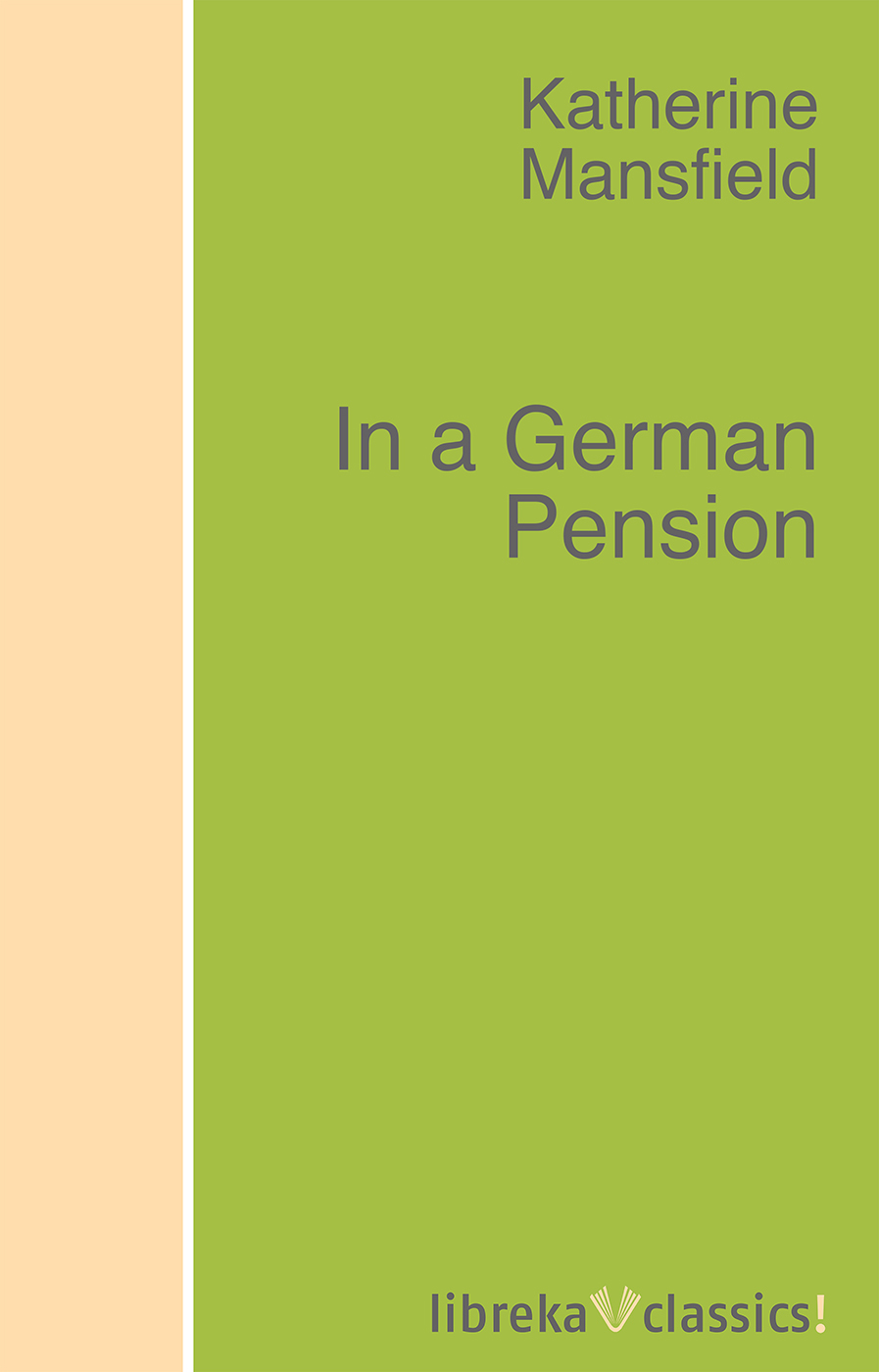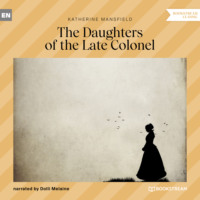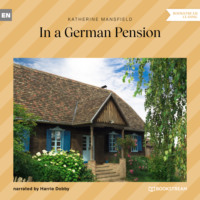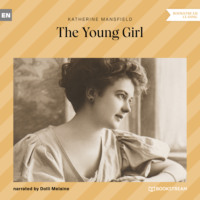
Полная версия
In a German Pension


Titel: In a German Pension
von William Shakespeare, H. G. Wells, Henry Van Dyke, Thomas Carlyle, Oscar Wilde, Joseph Conrad, Henry James, Anthony Hope, Henry Fielding, Giraldus Cambrensis, Daniel Defoe, Grammaticus Saxo, Edgar Rice Burroughs, Hugh Lofting, Agatha Christie, Sinclair Lewis, Eugène Brieux, Upton Sinclair, Booth Tarkington, Sax Rohmer, Jack London, Anna Katharine Green, Sara Jeannette Duncan, Xenophon, Alexandre Dumas père, John William Draper, Alice Christiana Thompson Meynell, Bram Stoker, Honoré de Balzac, William Congreve, Louis de Rougemont, Nikolai Vasilievich Gogol, Rolf Boldrewood, François Rabelais, Lysander Spooner, B. M. Bower, Henry Rider Haggard, William Hickling Prescott, Lafcadio Hearn, Robert Herrick, Jane Austen, Mark Twain, Mary Roberts Rinehart, Charles Babbage, Kate Douglas Smith Wiggin, Frank L. Packard, George Meredith, John Merle Coulter, Irvin S. Cobb, Edwin Mims, John Tyndall, Various, Charles Darwin, Sidney Lanier, Henry Lawson, Niccolò Machiavelli, George W. Crile, Théophile Gautier, Noah Brooks, James Thomson, Zane Grey, J. M. Synge, Virginia Woolf, Conrad Aiken, Edna St. Vincent Millay, Helen Cody Wetmore, Ayn Rand, Sir Thomas Malory, Gustave Flaubert, Edmond Rostand, Charlotte Brontë, Edith Wharton, Giles Lytton Strachey, Myrtle Reed, Ernest Bramah, Jules Verne, H. L. Mencken, H. Stanley Redgrove, Victor Lefebure, Edna Lyall, John Masefield, Charles Kingsley, Robert Burns, Edgar Lee Masters, Victor [pseud.] Appleton, Ellis Parker Butler, Mary Lamb, Charles Lamb, Johann Wolfgang von Goethe, Kenneth Grahame, Charles Dickens, John Ruskin, John Galt, James J. Davis, Owen Wister, William Blades, Sir Hall Caine, Sir Max Beerbohm, Baron Edward John Moreton Drax Plunkett Dunsany, Bret Harte, E. Phillips Oppenheim, Thomas Henry Huxley, A. B. Paterson, John N. Reynolds, Walter Dill Scott, Hans Gustav Adolf Gross, T. S. Eliot, Walt Whitman, Arthur Ransome, Jane Addams, Elizabeth, David Lindsay, Helen Bannerman, Charles A. Oliver, J. M. Barrie, Robert F. Murray, Andrew Lang, Jerome K. Jerome, Francis Thompson, Sydney Waterlow, Andrew Dickson White, Benjamin N. Cardozo, Karl Marx, Edouard Louis Emmanuel Julien Le Roy, Margaret Hill McCarter, Sir Donald Mackenzie Wallace, Howard Trueman, L. M. Montgomery, Frank T. Bullen, Baron Alfred Tennyson Tennyson, Jonathan Nield, Henry Wadsworth Longfellow, Charles Reade, Ouida, Washington Irving, Benjamin Louis Eulalie de Bonneville, Sir Walter Scott, Stewart Edward White, Arthur Hugh Clough, Baron Edward Bulwer Lytton Lytton, C.-F. Volney, T. Troward, graf Leo Tolstoy, Christopher Morley, James Madison, Alexander Hamilton, John Jay, Gilbert White, Percival Lowell, Frederick Marryat, Robert Graves, Thomas Holmes, Wilkie Collins, Maria Edgeworth, Katherine Mansfield, E. Nesbit, Olive Schreiner, Jeronimo Lobo, O. Henry, James Slough Zerbe, Donald Ogden Stewart, Johanna Spyri, Eleanor H. Porter, William Tatem Tilden, Sol Plaatje, Rafael Sabatini, William Makepeace Thackeray, George Gissing, Maksim Gorky, Baron Thomas Babington Macaulay Macaulay, H. G. Keene
ISBN 978-3-7429-1416-3
Alle Rechte vorbehalten.
Es ist ohne vorherige schriftliche Erlaubnis nicht gestattet, dieses Werk im Ganzen oder in Teilen zu vervielfältigen oder zu veröffentlichen.
IN A GERMAN PENSION
By Katherine Mansfield
Contents
1. GERMANS AT MEAT. 2. THE BARON. 3. THE SISTER OF THE BARONESS. 4. FRAU FISCHER. 5. FRAU BRECHENMACHER ATTENDS A WEDDING. 6. THE MODERN SOUL. 7. AT LEHMANN'S. 8. THE LUFT BAD. 9. A BIRTHDAY. 10. THE CHILD-WHO-WAS-TIRED. 11. THE ADVANCED LADY. 12. THE SWING OF THE PENDULUM. 13. A BLAZE.
1. GERMANS AT MEAT.
Bread soup was placed upon the table. "Ah," said the Herr Rat, leaning upon the table as he peered into the tureen, "that is what I need. My 'magen' has not been in order for several days. Bread soup, and just the right consistency. I am a good cook myself"—he turned to me.
"How interesting," I said, attempting to infuse just the right amount of enthusiasm into my voice.
"Oh yes—when one is not married it is necessary. As for me, I have had all I wanted from women without marriage." He tucked his napkin into his collar and blew upon his soup as he spoke. "Now at nine o'clock I make myself an English breakfast, but not much. Four slices of bread, two eggs, two slices of cold ham, one plate of soup, two cups of tea—that is nothing to you."
He asserted the fact so vehemently that I had not the courage to refute it.
All eyes were suddenly turned upon me. I felt I was bearing the burden of the nation's preposterous breakfast—I who drank a cup of coffee while buttoning my blouse in the morning.
"Nothing at all," cried Herr Hoffmann from Berlin. "Ach, when I was in England in the morning I used to eat."
He turned up his eyes and his moustache, wiping the soup drippings from his coat and waistcoat.
"Do they really eat so much?" asked Fraulein Stiegelauer. "Soup and baker's bread and pig's flesh, and tea and coffee and stewed fruit, and honey and eggs, and cold fish and kidneys, and hot fish and liver? All the ladies eat, too, especially the ladies."
"Certainly. I myself have noticed it, when I was living in a hotel in Leicester Square," cried the Herr Rat. "It was a good hotel, but they could not make tea—now—"
"Ah, that's one thing I CAN do," said I, laughing brightly. "I can make very good tea. The great secret is to warm the teapot."
"Warm the teapot," interrupted the Herr Rat, pushing away his soup plate. "What do you warm the teapot for? Ha! ha! that's very good! One does not eat the teapot, I suppose?"
He fixed his cold blue eyes upon me with an expression which suggested a thousand premeditated invasions.
"So that is the great secret of your English tea? All you do is to warm the teapot."
I wanted to say that was only the preliminary canter, but could not translate it, and so was silent.
The servant brought in veal, with sauerkraut and potatoes.
"I eat sauerkraut with great pleasure," said the Traveller from North Germany, "but now I have eaten so much of it that I cannot retain it. I am immediately forced to—"
"A beautiful day," I cried, turning to Fraulein Stiegelauer. "Did you get up early?"
"At five o'clock I walked for ten minutes in the wet grass. Again in bed. At half-past five I fell asleep, and woke at seven, when I made an 'overbody' washing! Again in bed. At eight o'clock I had a cold-water poultice, and at half past eight I drank a cup of mint tea. At nine I drank some malt coffee, and began my 'cure.' Pass me the sauerkraut, please. You do not eat it?"
"No, thank you. I still find it a little strong."
"Is it true," asked the Widow, picking her teeth with a hairpin as she spoke, "that you are a vegetarian?"
"Why, yes; I have not eaten meat for three years."
"Im—possible! Have you any family?"
"No."
"There now, you see, that's what you're coming to! Who ever heard of having children upon vegetables? It is not possible. But you never have large families in England now; I suppose you are too busy with your suffragetting. Now I have had nine children, and they are all alive, thank God. Fine, healthy babies—though after the first one was born I had to—"
"How WONDERFUL!" I cried.
"Wonderful," said the Widow contemptuously, replacing the hairpin in the knob which was balanced on the top of her head. "Not at all! A friend of mine had four at the same time. Her husband was so pleased he gave a supper-party and had them placed on the table. Of course she was very proud."
"Germany," boomed the Traveller, biting round a potato which he had speared with his knife, "is the home of the Family."
Followed an appreciative silence.
The dishes were changed for beef, red currants and spinach. They wiped their forks upon black bread and started again.
"How long are you remaining here?" asked the Herr Rat.
"I do not know exactly. I must be back in London in September."
"Of course you will visit Munchen?"
"I am afraid I shall not have time. You see, it is important not to break into my 'cure.'"
"But you MUST go to Munchen. You have not seen Germany if you have not been to Munchen. All the Exhibitions, all the Art and Soul life of Germany are in Munchen. There is the Wagner Festival in August, and Mozart and a Japanese collection of pictures—and there is the beer! You do not know what good beer is until you have been to Munchen. Why, I see fine ladies every afternoon, but fine ladies, I tell you, drinking glasses so high." He measured a good washstand pitcher in height, and I smiled.
"If I drink a great deal of Munchen beer I sweat so," said Herr Hoffmann. "When I am here, in the fields or before my baths, I sweat, but I enjoy it; but in the town it is not at all the same thing."
Prompted by the thought, he wiped his neck and face with his dinner napkin and carefully cleaned his ears.
A glass dish of stewed apricots was placed upon the table.
"Ah, fruit!" said Fraulein Stiegelauer, "that is so necessary to health. The doctor told me this morning that the more fruit I could eat the better."
She very obviously followed the advice.
Said the Traveller: "I suppose you are frightened of an invasion, too, eh? Oh, that's good. I've been reading all about your English play in a newspaper. Did you see it?"
"Yes." I sat upright. "I assure you we are not afraid."
"Well, then, you ought to be," said the Herr Rat. "You have got no army at all—a few little boys with their veins full of nicotine poisoning."
"Don't be afraid," Herr Hoffmann said. "We don't want England. If we did we would have had her long ago. We really do not want you."
He waved his spoon airily, looking across at me as though I were a little child whom he would keep or dismiss as he pleased.
"We certainly do not want Germany," I said.
"This morning I took a half bath. Then this afternoon I must take a knee bath and an arm bath," volunteered the Herr Rat; "then I do my exercises for an hour, and my work is over. A glass of wine and a couple of rolls with some sardines—"
They were handed cherry cake with whipped cream.
"What is your husband's favourite meat?" asked the Widow.
"I really do not know," I answered.
"You really do not know? How long have you been married?"
"Three years."
"But you cannot be in earnest! You would not have kept house as his wife for a week without knowing that fact."
"I really never asked him; he is not at all particular about his food."
A pause. They all looked at me, shaking their heads, their mouths full of cherry stones.
"No wonder there is a repetition in England of that dreadful state of things in Paris," said the Widow, folding her dinner napkin. "How can a woman expect to keep her husband if she does not know his favourite food after three years?"
"Mahlzeit!"
"Mahlzeit!"
I closed the door after me.
2. THE BARON.
"Who is he?" I said. "And why does he sit always alone, with his back to us, too?"
"Ah!" whispered the Frau Oberregierungsrat, "he is a BARON."
She looked at me very solemnly, and yet with the slightest possible contempt—a "fancy-not-recognising-that-at-the-first-glance" expression.
"But, poor soul, he cannot help it," I said. "Surely that unfortunate fact ought not to debar him from the pleasures of intellectual intercourse."
If it had not been for her fork I think she would have crossed herself.
"Surely you cannot understand. He is one of the First Barons."
More than a little unnerved, she turned and spoke to the Frau Doktor on her left.
"My omelette is empty—EMPTY," she protested, "and this is the third I have tried!"
I looked at the First of the Barons. He was eating salad—taking a whole lettuce leaf on his fork and absorbing it slowly, rabbit-wise—a fascinating process to watch.
Small and slight, with scanty black hair and beard and yellow-toned complexion, he invariably wore black serge clothes, a rough linen shirt, black sandals, and the largest black-rimmed spectacles that I had ever seen.
The Herr Oberlehrer, who sat opposite me, smiled benignantly.
"It must be very interesting for you, gnadige Frau, to be able to watch.... of course this is a VERY FINE HOUSE. There was a lady from the Spanish Court here in the summer; she had a liver. We often spoke together."
I looked gratified and humble.
"Now, in England, in your 'boarding 'ouse', one does not find the First Class, as in Germany."
"No, indeed," I replied, still hypnotised by the Baron, who looked like a little yellow silkworm.
"The Baron comes every year," went on the Herr Oberlehrer, "for his nerves. He has never spoken to any of the guests—YET!" A smile crossed his face. I seemed to see his visions of some splendid upheaval of that silence—a dazzling exchange of courtesies in a dim future, a splendid sacrifice of a newspaper to this Exalted One, a "danke schon" to be handed down to future generations.
At that moment the postman, looking like a German army officer, came in with the mail. He threw my letters into my milk pudding, and then turned to a waitress and whispered. She retired hastily. The manager of the pension came in with a little tray. A picture post card was deposited on it, and reverently bowing his head, the manager of the pension carried it to the Baron.
Myself, I felt disappointed that there was not a salute of twenty-five guns.
At the end of the meal we were served with coffee. I noticed the Baron took three lumps of sugar, putting two in his cup and wrapping up the third in a corner of his pocket-handkerchief. He was always the first to enter the dining-room and the last to leave; and in a vacant chair beside him he placed a little black leather bag.
In the afternoon, leaning from my window, I saw him pass down the street, walking tremulously and carrying the bag. Each time he passed a lamp-post he shrank a little, as though expecting it to strike him, or maybe the sense of plebeian contamination...
I wondered where he was going, and why he carried the bag. Never had I seen him at the Casino or the Bath Establishment. He looked forlorn, his feet slipped in his sandals. I found myself pitying the Baron.
That evening a party of us were gathered in the salon discussing the day's "kur" with feverish animation. The Frau Oberregierungsrat sat by me knitting a shawl for her youngest of nine daughters, who was in that very interesting, frail condition... "But it is bound to be quite satisfactory," she said to me. "The dear married a banker—the desire of her life."
There must have been eight or ten of us gathered together, we who were married exchanging confidences as to the underclothing and peculiar characteristics of our husbands, the unmarried discussing the over-clothing and peculiar fascinations of Possible Ones.
"I knit them myself," I heard the Frau Lehrer cry, "of thick grey wool. He wears one a month, with two soft collars."
"And then," whispered Fraulein Lisa, "he said to me, 'Indeed you please me. I shall, perhaps, write to your mother.'"
Small wonder that we were a little violently excited, a little expostulatory.









